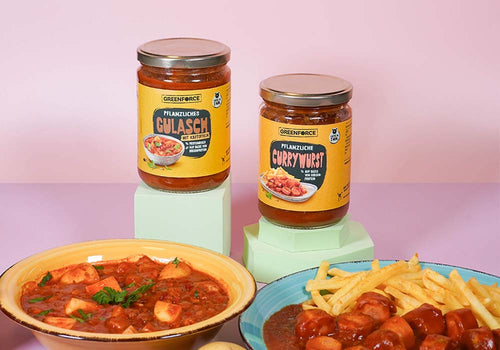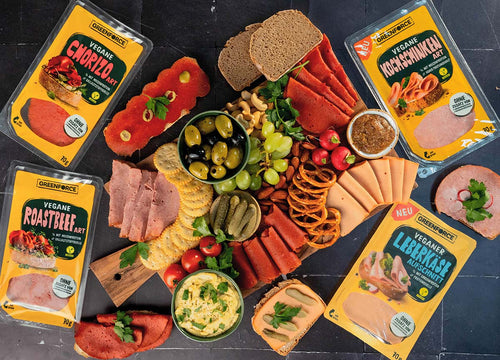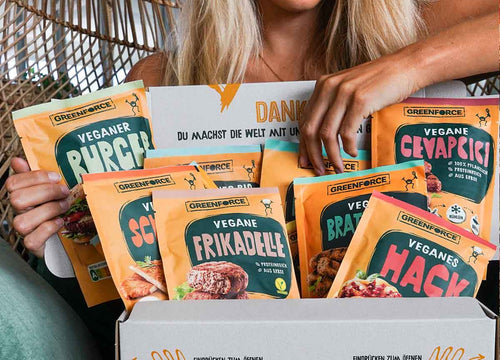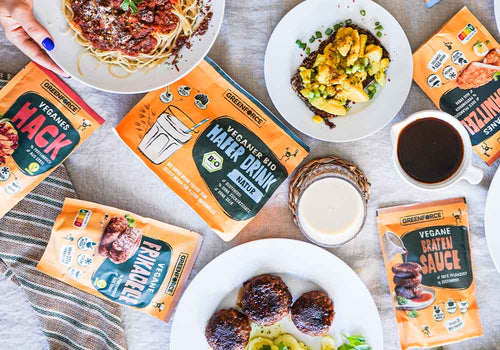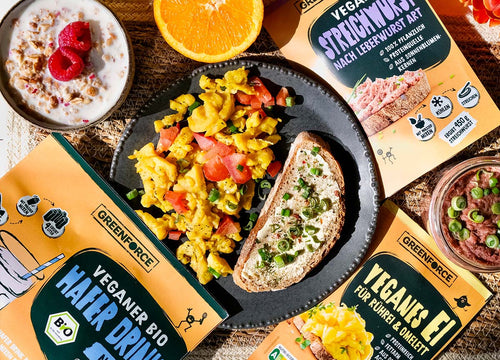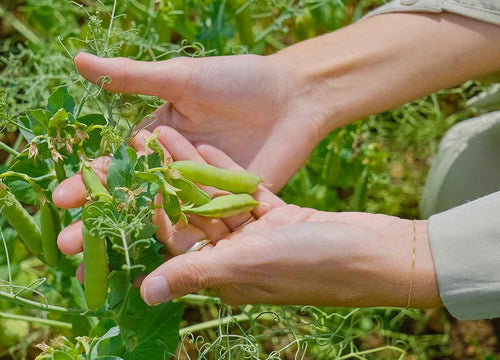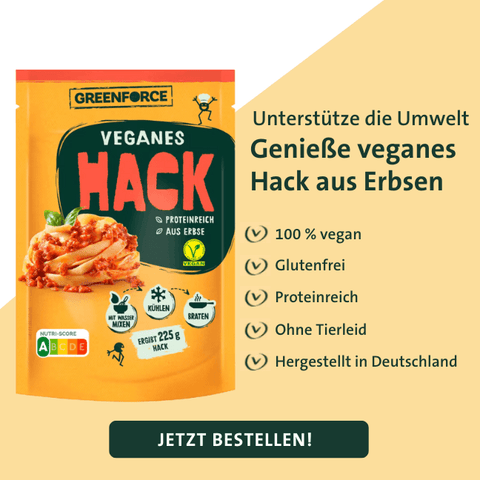“ During pregnancy you have to eat for two ” – many women have to hear this widespread statement or even say it to themselves. But is that true? No, because as long as you eat a healthy and balanced diet, you don't necessarily have to eat more. It really depends on the nutrients and vitamins.
And what about a vegan diet during pregnancy? Is that possible and does it have to be eaten for two?
We'll tell you: Everything you should know about a vegan diet during pregnancy.
Vegan during pregnancy?
Is it even allowed to eat vegan when you have a baby on the way? The answer is yes, it is possible - but you should plan your diet well. Vegan fast food should definitely be avoided during this time. A balanced, varied and, above all, healthy diet is the be-all and end-all.
While women don't need to eat twice as much during pregnancy, they do need to pay attention to their nutrient and vitamin intake. Because they are raising a baby, there is an increased consumption of minerals, vitamins and trace elements. It is important to keep an eye on these so as not to cause malnutrition in the baby.
Is a healthy diet enough during pregnancy?
If pregnant women want to eat a vegan diet, it is important to ensure that they get enough nutrients. The amount of nutrients required can vary from woman to woman . Some people absorb nutrients better than others or consume more.
We recommend extensive advice about a vegan diet during pregnancy. For example, you can get professional nutritional advice to guide you through the months.
It is also very important to have your doctor check your nutritional values by taking a blood test. In this way, if a deficiency occurs, you can react early and adjust your diet.
Which nutrients should you pay attention to during pregnancy?
Nutrients that may be deficient in your diet are called critical nutrients. The following nutrients can be considered critical during pregnancy:
- Calcium,
- Iron,
- Iodine,
- Zinc,
- the vitamins B12, B2 and D as well
- Omega-3 fatty acid docosahexaenoic acid (DHA).
These should definitely be kept an eye on.
In women who are pregnant, the nutrient requirements are sometimes significantly increased. For the nutrients folic acid, iodine and iron, a significantly increased intake is recommended before or from the start of the desire to have children. In addition, there is a significant additional need for protein from the fourth month onwards, which increases again in the last third. There may also be an increased need for most vitamins (e.g. vitamin A, B6, C) and minerals (e.g. zinc).

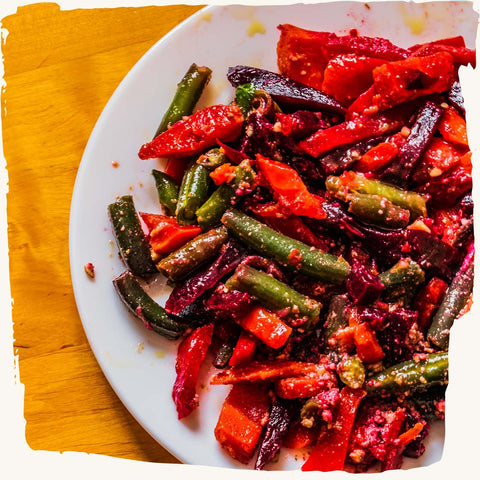
Iron intake
Most people get their iron intake from meat and fish. However, vegans avoid these foods completely - iron deficiency can occur. Iron can be administered to the body in the form of dietary supplements, but this should not be done without consulting a doctor. An overdose of iron can lead to long-term damage . Among other things, it can impair the function of the heart, blood vessels and liver. We therefore strongly recommend that you consult your doctor.
You can also get enough iron through diet.
Good plant sources of iron are:
- Beetroot,
- Brussels sprouts,
- Fennel,
- Kale,
- products made from whole grains,
- legumes such as lentils or chickpeas,
- Oatmeal,
- Nuts,
- Sesame seeds,
- Pumpkin seeds or
- Soy.
In order for the body to absorb iron, it needs support in the form of vitamin C, which is found, for example, in oranges, peppers and broccoli.
Zinc intake
Similar to iron intake, vitamin C also promotes zinc's ability to absorb the mineral in the body. Zinc deficiency can be eliminated through a balanced diet. Foods rich in zinc include: legumes, whole grains, soy products (e.g. miso), seeds and nuts. Whole grain products also contain zinc. If you eat these foods at regular intervals, you can prevent zinc deficiency.
However, coffee and tea inhibit zinc absorption. However, it is not recommended to consume coffee while a woman is pregnant . Below we will explain to you why this is the case.
DHA intake
DHA is the abbreviation for docosahexaenoic acid, an essential and bioactive omega-3 fatty acid, which is mainly found in sea fish. The requirement is around 200 milligrams per day. However, since vegans do not eat sea fish, linseed oil is an alternative. The oil is enriched with DHA and is made from microalgae. One to two tablespoons of linseed oil should be consumed daily during pregnancy.
Calcium intake
Pregnant and breastfeeding women need around 1000 mg of calcium per day . If you are younger than 19 years old, it is even 1200 mg. However, many do not reach this value, also because a high salt intake promotes the excretion of calcium. Therefore, salt should only be consumed in moderation.
Foods rich in calcium are: green vegetables (fennel, kale, broccoli, leeks ...) and fruits (blackberries, currants, raspberries), herbs and nuts. There is also water enriched with calcium. This contains a minimum of 150 mg of calcium per liter.

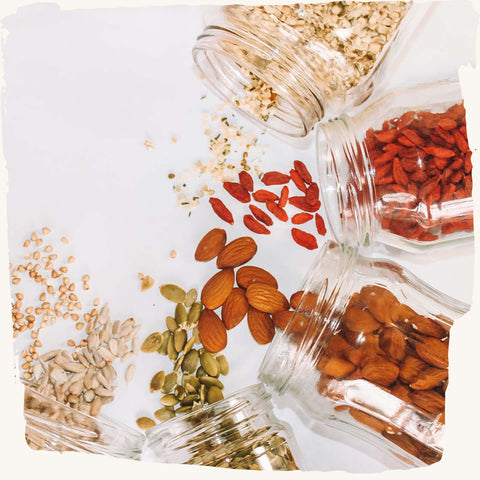
Iodine intake
Sufficient iodine intake is recommended before pregnancy, if planned. It is recommended to consume around 100 micrograms of iodine. Good sources are
- iodized table salt,
- Spinach,
- Broccoli,
- Nuts,
- Algae (e.g. nori algae) and
- Seaweed.
So vegan sushi can be a good choice.
Vitamin D intake
Especially during pregnancy, an adequate supply of vitamin D is crucial for mother and child.
Vitamin D increases the absorption of calcium from the gastrointestinal tract. Bones can only harden sufficiently with sufficient vitamin D and calcium. Vitamin D is largely absorbed through the skin and the sun. You should be in the sun for around 15 to 30 minutes every day. In winter or in more northern regions, the sun intake is often not enough, so women also have to take a nutritional supplement. The same applies here: please consult your doctor beforehand. Every person is unique and can react differently and absorb different amounts of vitamins.
Vitamin B2 intake
Vitamin B2 – riboflavin is important, among other things, for the growth and embryonic development of the fetus. The need increases during pregnancy and breastfeeding. If there is a deficiency, it can have serious consequences for the growing baby and can even lead to deformities.
Deficiency can be prevented with a balanced diet. These foods contain an increased vitamin B2 content: porcini mushrooms, chanterelles, spinach, kale, broccoli, soybeans, peas, lentils, beans.
Sufficient energy/calorie intake
Since a vegan diet involves eating a lot of vegetables and fruit, you should definitely make sure you get enough energy and calories. The human body has a basic energy consumption of approximately 4 kilojoules (kJ) per kilogram of body weight per hour. No matter whether you are sleeping, working or moving. You can calculate consumption by multiplying your own body weight by 4 and then by 24 (hours per day). This gives the energy consumption per day without physical exertion. However, if you spend a lot of time on your feet and work hard, you also use up more energy. For example, you can expect 1000 - 2000 kJ for sedentary work, and almost 5000 kJ for medium-heavy work, such as baking.
If you are unsure how much you consume and whether you are consuming enough, ask a nutritionist to calculate your exact consumption. This way you can be sure that you always eat enough.
Vegan during pregnancy: tips for everyday life
Since the body of pregnant women has to perform at peak performance every day to ensure the care of two people, a healthy lifestyle is important. Above all, fresh and less processed foods should be used. Meals should be freshly cooked and of high quality. Not only can healthy fiber be absorbed, but the child's taste development in the womb is also promoted. This prepares the child for a balanced diet later on.
You should avoid alcohol and cigarettes throughout your entire pregnancy!
Consuming these luxury foods can have serious consequences for the child.
Excessive consumption of coffee is also not recommended during this time. Caffeine is processed by the body in the stomach. This means increased blood pressure, accelerated heartbeat and stimulated nerve cells in the brain. Normally the caffeine is broken down again after four to five hours, but during pregnancy it can take up to 18 hours due to slowed metabolism. The baby in the womb also absorbs the caffeine and is then permanently under the influence of caffeine. This can later lead to obesity and behavioral problems such as hyperactivity for the child.
For these reasons, a maximum daily consumption of 200 milligrams of caffeine is recommended for pregnant women. With this amount it can be assumed that the baby will not be harmed.
In order to consume all nutrients sufficiently, the focus should be on one or two nutrients per meal. So, for example, this could be a breakfast rich in iron and vitamin C. Vegan overnight oats with a glass of freshly squeezed orange juice are the perfect start to the day.
An optimal vegan meal plan during pregnancy could look like this:
- 3 portions of vegetables daily (400 - 500g),
- 2 portions of fruit,
- 4 portions of grain or potatoes (400 - 600g),
- 200 ml calcium-enriched vegan plant drinks ,
- 100 ml soy yogurt,
- 30 – 60 g nuts, nut puree or seeds,
- 2 tbsp linseed oil,
- 1.5 – 2.5 liters of calcium-rich water.
You should eat 2 portions of legumes and 2 portions of tofu or seitan every week. Sufficient exercise in the fresh air and sunlight are also important. It is recommended to go for a walk for around 15 – 30 minutes and enjoy the sunshine.
Vegan pregnancy: Our conclusion
Going vegan during pregnancy is possible - but you shouldn't do it on your own. Regular blood tests for nutrient deficiencies are very important. We also recommend having professional nutritional advice on hand during this time, who can provide helpful tips and recipe ideas.
Without additional intake of vitamin B12, veganism can become dangerous. In addition, it may be necessary to take additional supplements, but this should not be decided on your own, but rather together with your doctor.
The risks of a vegan diet while the mother is carrying a baby are primarily the possible nutrient deficiency. The body can lack important vitamins, minerals and trace elements if you eat the wrong or unhealthy diet.
If this is the case and nothing is done about it, it could cause the baby to have malformations. Therefore, as already mentioned, a doctor should definitely be involved.

